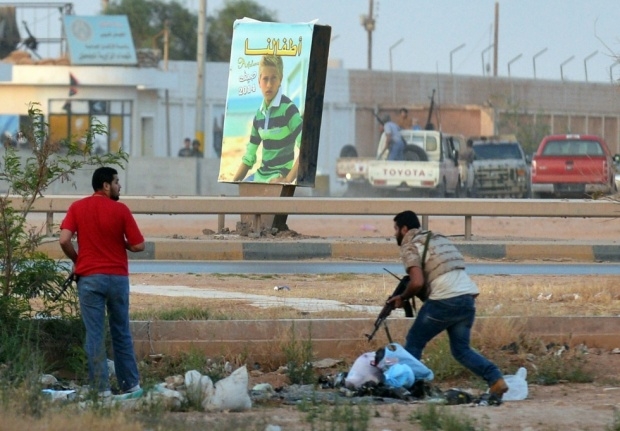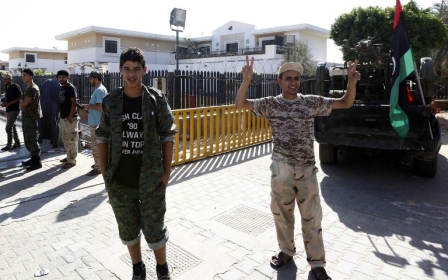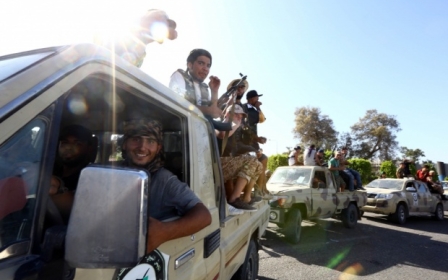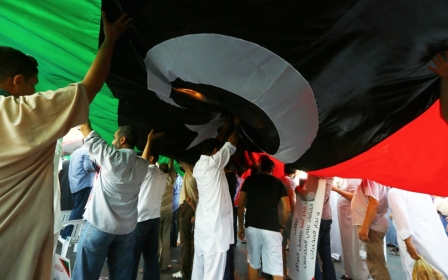25 Libyans killed in Benghazi airport clashes

Twenty-five people were killed and several others wounded on Monday in clashes between troops loyal to retired general Khalifa Haftar and the self-styled Benghazi Revolutionaries' Shura Council militia in the eastern city of Benghazi.
Ten council fighters were killed and several others wounded as a result of the clashes, a source close to the council told Anadolu Agency on condition of anonymity.
An officer with Haftar's army had earlier told AA that 11 troops loyal to the retired general were killed in the clashes. He returned, however, to say that death toll among Haftar's troops had risen to 15.
Farag Milod said the clashes had erupted when the members of the militia tried to advance in large numbers toward a Benghazi civilian airport and an air force base.
He added that Haftar's troops succeeded in foiling the attack, which aimed at occupying the airport and the air force base.
"The militia seems to have planned for this attack a few days ago," Milod said, citing the intensity of the attack.
He denied reports that the militia had managed to control the airport or the air force base.
A leader of the Benghazi Revolutionaries' Shura Council militia, meanwhile, said militia fighters had managed to enter the air force base and the airport for some time, but had to pull back quickly under aerial attacks by Haftar's planes.
In May, Haftar declared war on armed Islamist militias based in eastern Libya, dubbing his campaign "Operation Dignity" – the stated aim of which was to "purge" Libya of "extremists."
At the time, the government in Tripoli described Haftar's campaign as a "coup attempt." After serving as army chief-of-staff under Muammar Gaddafi, Haftar spent nearly two decades in the United States in exile before returning to Libya in 2011 to join the uprising against the autocratic ruler.
Two governments separated by 1,600 km
Libya has been sliding into chaos since Muammar Gaddafi was overthrown and killed three years ago, with interim authorities confronting powerful militias which fought to oust the veteran dictator.
The Tobruk government announced last week it had tendered its resignation to parliament, days after a rival Islamist administration was created. The parliament, which was elected in June, and the government are operating out of eastern Libya for security reasons.
Also last week, a rival body and the country's most recent previous parliament, the General National Congress, reconvened in Tripoli and elected pro-Islamist Omar al-Hassi as prime minister.
The move came after militias allied to the GNC took control of key locations in the capital, including Tripoli International Airport. The militiamen also, over the past week, apparently moved into the US embassy compound in Tripoli, which had been evacuated in July.
The re-emergence of the GNC meant that the country essentially has two parliaments claiming legitimacy, this time operating 1,600 km from one another.
While the House of Representatives won June elections which saw Islamist groups win only 30 seats out of 200, the GNC holds that it is still the country's legitimate government because there was never a proper transition from the old parliament to the new parliament.
Libya Dawn, allied to the GNC, rejects the legitimacy of the elected parliament because it allegedly supported air raids last month -- which US officials said were carried out by the United Arab Emirates -- against its fighters in the airport area before they defeated nationalist militia rivals.
Parliament has in turned branded Libya Dawn - also referred to in Arabic as Fajr Libya - as "terrorists", putting them in the same boat as the Ansar al-Sharia jihadists who control most of second city Benghazi.
On Monday, the parliament in Tobruk voted to task Thani with forming a streamlined new government, the official news agency Lana reported.
He was named to form an 18-member team, down from the outgoing lineup's number of around 30, it said, adding that seven of the new ministers would put together a crisis cabinet.
Increasingly awkward?
International powers, many of whose foreign ministries have fled Tripoli in the face of growing security problems, largely treat the House of Representatives as Libya's legitimate government, seeing the body as having electoral legitimacy, Toaldo said.
However, if the Libya Dawn coalition continues to consolidate power in Tripoli and key institutions, like the Central Bank and the National Oil Corporation, lean towards the GNC as a result, an increasingly awkward situation could continue.
"Many ambassadors are privately thanking God that they are no longer in Tripoli because sooner or later, they will get an invitation in Tripoli [from the GNC] which they cannot accept because they don't recognise it," Toaldo said.
Going forward, one major question will be which government, if any, gains control of the country's purse, he added. Currently, the Central Bank is not paying foreign contracts and is making a minimal payments to state employees, and it is unclear who is in charge of these payments.
"I would say that no one is in control as of now because the purse of the Central Bank has only paid salaries," Toaldo said.
New MEE newsletter: Jerusalem Dispatch
Sign up to get the latest insights and analysis on Israel-Palestine, alongside Turkey Unpacked and other MEE newsletters
Middle East Eye delivers independent and unrivalled coverage and analysis of the Middle East, North Africa and beyond. To learn more about republishing this content and the associated fees, please fill out this form. More about MEE can be found here.




